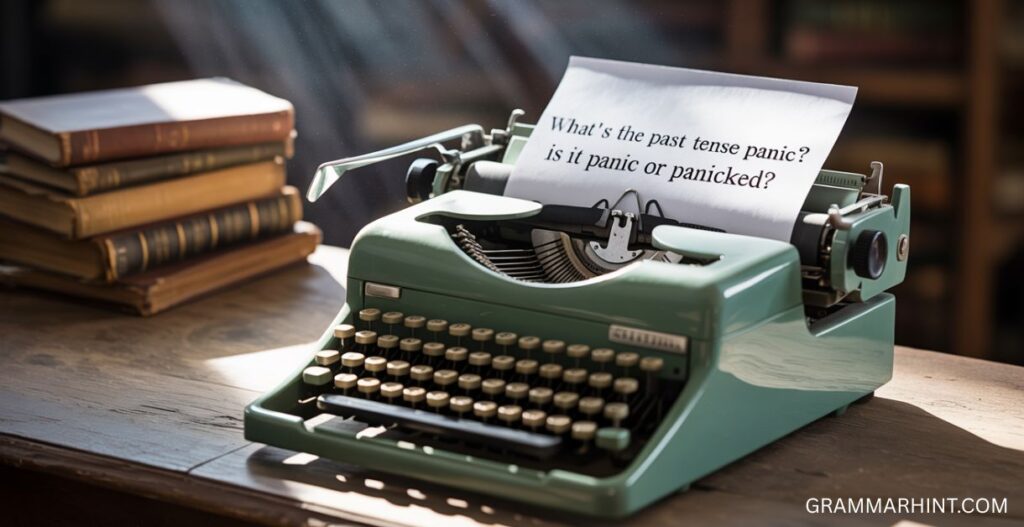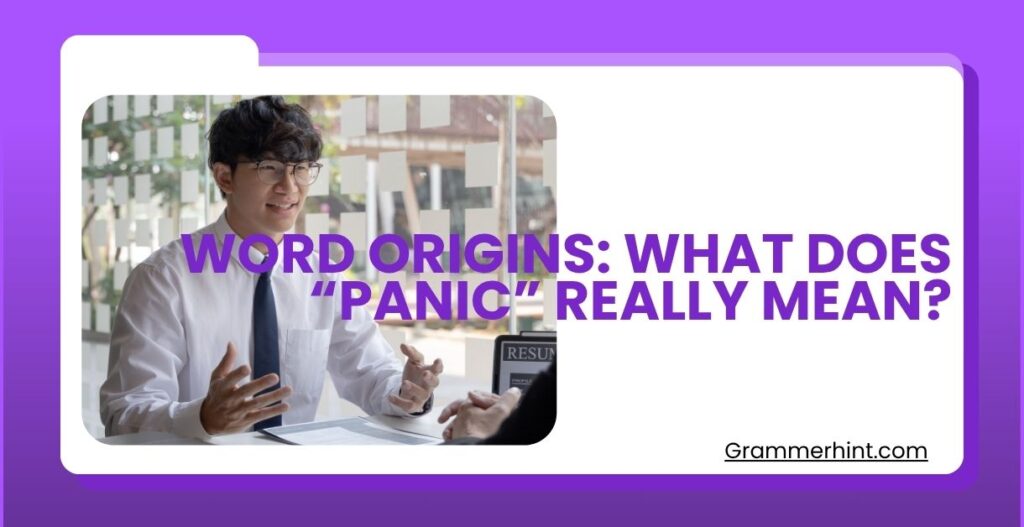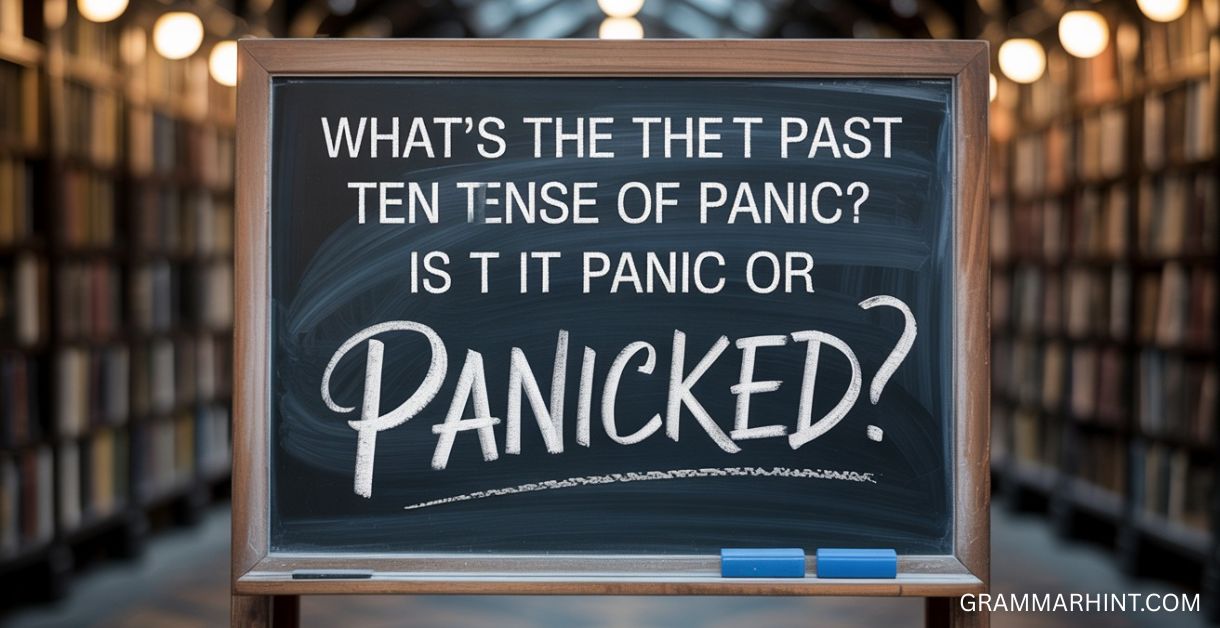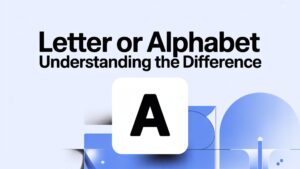Why “Panic” Creates So Much Confusion
Have you ever stopped mid-sentence, wondering, “Wait, is it ‘I panic’ or ‘I panicked’?” You’re not alone. English verbs can be tricky, and the past tense of panic often trips people up.
It might seem like a simple word, but when it comes to tense transformation, spelling rules in English, and proper English grammar, “panic” offers a surprising number of lessons—especially if you’ve ever texted your friend “I panic yesterday 😬.”
Let’s unpack this once and for all and explore:
- The correct panic past tense
- Why the spelling changes the way it does
- How to use “panicked” in real-life sentences
- The word’s grammar role as a verb, noun, and adjective
- A dive into panic’s pronunciation and spelling quirks
- Real-world examples including exam stress, public crowd fear, and even botanical meaning of panic
What’s the Past Tense of “Panic”? Panic or Panicked?

Let’s get straight to it:
👉 The past tense of “panic” is “panicked.”
👉 “Panic” is the base or infinitive form.
👉 “Panicked” is the simple past and past participle form.
If you’ve ever asked yourself, “Is panicked a word?” — yes, it absolutely is.
Simple Example
Incorrect: Yesterday, I panic when I lost my passport.
Correct: Yesterday, I panicked when I lost my passport.
Email Example:
Subject: Missed the Presentation – Apologies
Hi Martin,
I truly apologize for missing this morning’s call. I panicked when I saw the meeting notification late, and I froze instead of logging in.
I hope I can catch up and rejoin the conversation soon.
Best,
Sandra
Verb Conjugation of “Panic”
Let’s look at the conjugation of panic in a standard verb tense chart format:
| Tense | Form | Example |
|---|---|---|
| Base Form | panic | I panic when I forget my keys. |
| Past Tense | panicked | I panicked during the fire drill. |
| Past Participle | panicked | She had panicked too soon. |
| Present Continuous | panicking | He is panicking before his exam. |
| Present Perfect | has/have panicked | They have panicked over nothing. |
| Past Perfect | had panicked | We had panicked before help arrived. |
| Future Perfect | will have panicked | She will have panicked by then. |
Related Concepts:
- Simple Past Grammar
- English Past Participle Rules
- Verb with “-ed” Ending
- English Verb Forms
Panic – Verb, Noun, or Adjective?
The word panic plays multiple roles depending on how it’s used:
As a Verb (Action)
You panic when you react in fear or distress, often irrationally.
- Present: “I panic when I speak in public.”
- Past: “I panicked when I saw the smoke.”
- Future: “I will panic if we miss our flight.”
This can be a transitive verb or an intransitive verb:
- Transitive: “She panicked the crowd with false information.”
- Intransitive: “He panicked and ran off.”
As a Noun
A noun describes a state of sudden fear or anxiety.
- “The announcement caused panic in the subway.”
- “There was public crowd fear during the blackout.”
As an Adjective
“Panicked” can also act as an adjective, describing someone or something in a state of alarm.
- “His panicked expression gave it away.”
- “The panicked passengers rushed to the exit.”
“Panicked” — Spelling, Pronunciation, and Grammar
Why Not “Paniced”? Let’s Break the Spelling Down
You might wonder: Why is it panicked and not paniced?
That’s where regular verb spelling rules come into play.
Rule:
When a verb ends in -ic, like panic, and you want to add “-ed,” you first add a “k” before “-ed.”
That’s how you get:
- panic → panicked
- mimic → mimicked
- picnic → picnicked
It helps maintain pronunciation consistency and avoids awkward-looking forms.
How to Spell Panicked?
👉 Correct: P-A-N-I-C-K-E-D
👉 Avoid: paniced (missing the “k”)
This spelling ensures you don’t accidentally rhyme it with “iced” or “sliced.”
Panicked Pronunciation
Let’s look at both base and past tense:
- “Panic”: /ˈpænɪk/
- “Panicked”: /ˈpænɪkt/
Notice the subtle “k-t” ending in the second one. Try saying it aloud:
“I panic when I hear loud noises.”
“I panicked during the thunderstorm.”
Real-Life Scenarios Using “Panicked”
1. Public Crowd Fear
“The driver panicked when protesters surrounded the vehicle.”
2. Losing Important Items
“I panicked after realizing I left my phone in the taxi.”
3. Exam Stress
“She panicked and forgot everything she studied.”
4. Stock Market Panic
“Investors panicked, causing the market to nosedive.”
5. Emergencies (e.g., fire, storm, crash)
“He panicked when the fire alarm went off.”
Word Origins: What Does “Panic” Really Mean?

“Panic” originates from the Greek god Pan, known for causing sudden fear in shepherds and travelers. From this root, we get:
- Panic (noun): sudden overwhelming fear or anxiety
- Panicked (adjective): seized by terror or distress under pressure
Related emotional states:
- Fear
- Anxiety
- Alarm
- Hysteria
- Dread
- Consternation
- Turmoil
- Frenzy
Is “Panicked” Related to Other Words?
It sure is.
Check out this linguistic connection:
- Manic → shares the “-anic” ending and high emotional state
- Titanic → grand or overwhelming in size, sometimes in context of disaster
- Licked, Picked → similar spelling pattern in past tense
Bonus: Other Past Tense Verb Comparisons
Sometimes confusion with panic past tense comes from how other verbs behave. Here are a few:
| Base Verb | Past Tense | Notes |
|---|---|---|
| swing | swung | Irregular verb |
| troubleshoot | troubleshot | Unusual irregular |
| fall down | fell down | Irregular |
| panic | panicked | Regular, but with “-k” rule |
This shows why panic can be deceptive. Though it follows the regular pattern, the added “k” makes it look odd unless you know the rule.
Grammar Rule for Panic Spelling
Remember:
For verbs ending in -ic, add -k before -ed.
That’s your English grammar hack of the day.
What Is the Verb Form of Panic?
Let’s make it super clear:
- Infinitive: to panic
- Simple Present: I panic / she panics
- Present Continuous: am panicking
- Past Tense: I panicked
- Past Perfect: had panicked
- Present Perfect: have panicked
- Future Perfect: will have panicked
How to Use “Panicked” in a Sentence (More Examples)
Let’s go deeper into how to use panicked in a sentence.
| Situation | Sentence |
|---|---|
| Fire drill | “Everyone panicked when the bell rang.” |
| Family emergency | “She panicked after getting the call.” |
| Forgotten wallet | “I panicked when I couldn’t find my ID.” |
| Public speaking | “He panicked in front of the audience.” |
| Tech failure | “I panicked when the screen went black.” |
Is “Panicked” a Word? (Quick Recap)
Yes! It’s not only a word; it’s the correct past tense of panic.
Panic (verb) + ed → Panicked
Just add “k” before “-ed” for proper spelling and pronunciation.
Botanical Meaning of “Panic” – Bonus Insight 🌾
Surprise! “Panic” doesn’t only refer to human emotion.
There’s also a botanical meaning of “panic”—it refers to Panicum, a genus of grasses that includes millet.
So, panic grass is very real. But don’t worry, it won’t send you into a frenzy.
Final Thoughts – Mastering the Past Tense of Panic
So what have we learned?
- The correct past tense panic form is panicked, not panic or paniced
- Always add “k” before “-ed” when the verb ends in “-ic”
- Pronounce it as /ˈpænɪkt/, not /ˈpænɪkɛd/
- Use “panicked” in a variety of everyday scenarios involving fear, anxiety, or distress
- “Panic” can be a verb, noun, or adjective
- This is a regular verb, despite its unusual look in past tense
And remember: the more you see verbs in action, the more natural they become. So the next time someone asks, “What is the past form of panic?”, you’ll be the grammar hero with the answer.
Table: Summary of Key Terms
| Term | Description |
|---|---|
| Panic (verb) | To feel sudden terror or distress |
| Panicked | Past tense and past participle of panic |
| Verb conjugation | Transformation of verb forms through different tenses |
| Transitive verb | Requires a direct object (e.g., panicked the crowd) |
| Intransitive verb | Doesn’t need a direct object (e.g., she panicked) |
| Pronunciation | Panic: /ˈpænɪk/, Panicked: /ˈpænɪkt/ |
| Spelling rule | Add “k” before “-ed” for verbs ending in “-ic” |
| Grammar for beginners | Use clear tense forms to communicate time in verbs |
| Panicked meaning in English | Overcome by sudden fear or anxiety |









